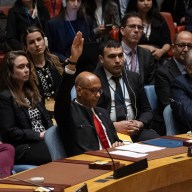 Filmmaker Alain Resnais, flanked by Hippolyte Girardot and his longtime partner Sabine Azema, does press at Cannes for his penultimate film, “You Ain’t Seen Nothin’ Yet.
Filmmaker Alain Resnais, flanked by Hippolyte Girardot and his longtime partner Sabine Azema, does press at Cannes for his penultimate film, “You Ain’t Seen Nothin’ Yet.
Credit: Getty Images
Alain Resnais, one of cinema’s most innovative and exciting directors, has passed away. He was 91.
Though his first features were made at the same time as the rise of the French New Wave, Resnais was a member of the “Left Bank” Parisian filmmakers, including Agnes Varda and Chris Marker.Resnais is perhaps best known for the one-two hit of “Hiroshima Mon Amour” and “Last Year at Marienbad,” from 1959 and 1961 — two of the first feature-length, mainstream modernist art films. They confounded viewers with their mysteries, their prismatic editing techniques and the ever-prowling camerawork.
“Marienbad” was in particular perplexing, revolving around an unsolvable conundrum: Did our two well-dressed (by no less than Coco Chanel) richies, played by Delphine Seyrig and Giorgio Albertazzi, hook up at a prior swanky get-together? Or are their lives so empty that life is just a hazy, half-remembered, gorgeous dream? (Its signature look also inspired this delightful Blur video.)
Both films, of course, were not without their haters. Harry and Michael Medved included “Marienbad” in their book of the 50 worst movies of all time, along with “Plan 9 From Outer Space,” “Santa Claus Conquers the Martians” and “Myra Breckinridge” (and “Bring Me the Head of Alfredo Garcia,” “Zabriskie Point” and “At Long Last Love”). Pauline Kael mocked those who tried to solve it, which admittedly is not the point. But it was also catnip for the day’s cinephiles, including Susan Sontag and the other Manhattan cognoscenti.
Both “Hiroshima Mon Amour” and “Last Year at Marienbad” started one of Resnais’ most distinguishable traits: his love of collaboration. Both found the director working with modernist authors: with Marguerite Duras for “Hiroshima” and Alain Robbe-Grillet for “Marienbad.” He would later turn to playwrights and theater, including, in his latter years, two adaptations of Alan Ayckbourn work: “Smoking/No Smoking” (1993) and “Private Fears in Public Places” (2006).
In fact, Resnais’ career finds him repeatedly shape-shifting, shedding one persona to adopt another. His final films don’t much resemble his early works, and nor do the ones in the middle or even the very start. Resnais began his career making shorts. One of these, 1948’s “Van Gogh,” won the Oscar for Best Short Subject, Two Reels. The most famous of these was 1955’s “Night and Fog,” one of the first (and best) films about the Holocaust — a 32 minute remembrance piece that prowls the abandoned camps in Auschwitz and Majdanek, while narrator Michel Bouquet reads the haunted prose of poet Jean Cayrol, asking if the images being shown could ever help stop such a thing happening again. (His 1956 film “Toute La Memoire du Monde,” which roams the cavernous Bibliotheque Nationale de France, is also truly something.)
Resnais worked in fits and stops, with gaps cropping up followed by revived returns. The 1960s were productive, producing 1963’s relatively, deceptively calmed down “Muriel” and 1968’s “Je T’aime, Je T’aime,” in which a man agrees to a scientific experiment that sends him hurtling through his memories. He winds up glomming onto a failed relationship, just as Jim Carrey’s sadsack did in “Eternal Sunshine of the Spotless Mind.” But there’s no escape for Resnais’ hero, who returns again and again to the same banal and traumatic memories, eventually forsaking the real world to be trapped inside his mind.
He worked infrequently in the 1970s, but the decade still produced one of his finest, the 1977 meta-dramedy “Providence,” one of his few English-language films. John Gielgud plays a miserable, bitter, dying novelist drunkenly making up the plot of his next work, which stars such luminaries as Ellen Burstyn, Dirk Bogarde, David Warner and Elaine Stritch. Characters change personas at a whim, and in one case turns into a wolfman. It’s one of the great, frank looks at an artist’s imagination, aging and family.
He followed that with 1980’s “Mon Oncle d’Amerique,” collaboration with a very unusual person: physician and philosopher Henri Laborit, who guides us through the lives of three characters (Gerard Depardieu, Nicole Garcia and Roger Pierre). Laborit insists that their actions follow certain socially and psychologically predetermined patterns, but Resnais is less clinical, and much more open to their humanity.
The last films of Resnais’ career show an entirely different side. If he was playful before, he eventually became puckish and good humored, filled with life. Beginning with 2003’s “Not on the Lips” — a committedly, almost alienatingly retro musical, featuring Lambert Wilson and Audrey Tautou — his last works play as though he knew his end was coming and he wanted to get out as much as he could. “Wild Grass,” from 2009, remains one of his strangest and most mischievous films — if perhaps not as out there as sounds 1989’s “I Want to Go Home,” written by Jules Feiffer and starring Broadway lyricist Adolph Green.
In 2012, he seemed to have made his swan song: the pointedly titled “You Ain’t Seen Nothin’ Yet,” in which a batch of his regulars — including Pierre Arditi, Mathieu Amalric — watched and eventually participated in a film presenting a play they once made with a recently departed director. (This is, sadly, the only Resnais film on Netflix Instant, though “Mon Oncle d’Amerique” and “Night and Fog” both reside on Hulu Plus.) But then Resnais, despite being 91, went and made another film, last year’s “Life of Reilly.”
Resnais is survived by Sabine Azema, his longtime partner and longtime collaborator, who acted in many of his films, many of which remain underseen. He’s a filmmaker worth even closer study, now or anytime.
















